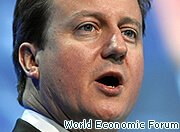The Conservative Party faces losing hundreds of seats at the local elections tomorrow because of the Prime Minister’s plans to redefine marriage, according to a new poll.
The survey also shows that many voters are turning to UKIP over the issue.
The ComRes poll, commissioned by the Coalition for Marriage, reveals that one in four of those who voted Conservative in 2010 say the policy is putting them off voting for the Party again.
Local
Asked, “Does the Coalition Government’s plans to legalise same sex marriage make you more or less likely to vote for each of these parties in next week’s local elections?” 26 per cent of Conservative 2010 voters say less likely.
Fewer than one in ten (nine per cent) say they are more likely to vote Tory again because of gay marriage.
And 22 per cent of those polled said they were planning to vote for UKIP, which opposes gay marriage.
Rise
Amongst Conservative 2010 voters this rises to one in four (25 per cent) who say they will be voting UKIP tomorrow.
Colin Hart, campaign director for the Coalition for Marriage, described the poll as a “real blow” for David Cameron.
“The Prime Minister has consistently backed the proposed changes to redefine marriage as part of the so called decontamination strategy, but it has not worked.”
Sceptical
“Every section of the electorate are highly sceptical about his motives, believing he is pushing this policy in a cynical attempt to make his Party look trendy and progressive. This is the ultimate failure of Blairite triangulation policy.”
“As Lady Thatcher famously said, ‘If you just set out to be liked, you would be prepared to compromise on anything at any time and you would achieve nothing’.”
He added: “No 10 will no doubt take comfort that his own performance is slightly less disastrous than Ed Miliband’s, who polls under a quarter, (24 per cent), but this compares with less than one in nine people (12.7 per cent) who voted in the same elections in 2009. So these figures represent a significant improvement on where Labour was four years ago.”
ComRes surveyed 1,502 adults last week in areas of England where local elections are taking place tomorrow.

